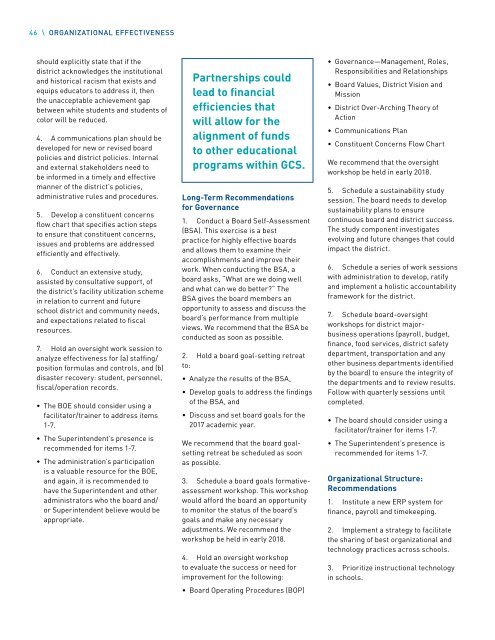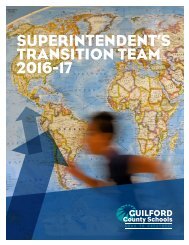Transition Team 2016-17 Final Report
Create successful ePaper yourself
Turn your PDF publications into a flip-book with our unique Google optimized e-Paper software.
46 \ ORGANIZATIONAL EFFECTIVENESS<br />
should explicitly state that if the<br />
district acknowledges the institutional<br />
and historical racism that exists and<br />
equips educators to address it, then<br />
the unacceptable achievement gap<br />
between white students and students of<br />
color will be reduced.<br />
4. A communications plan should be<br />
developed for new or revised board<br />
policies and district policies. Internal<br />
and external stakeholders need to<br />
be informed in a timely and effective<br />
manner of the district’s policies,<br />
administrative rules and procedures.<br />
5. Develop a constituent concerns<br />
flow chart that specifies action steps<br />
to ensure that constituent concerns,<br />
issues and problems are addressed<br />
efficiently and effectively.<br />
6. Conduct an extensive study,<br />
assisted by consultative support, of<br />
the district’s facility utilization scheme<br />
in relation to current and future<br />
school district and community needs,<br />
and expectations related to fiscal<br />
resources.<br />
7. Hold an oversight work session to<br />
analyze effectiveness for (a) staffing/<br />
position formulas and controls, and (b)<br />
disaster recovery: student, personnel,<br />
fiscal/operation records.<br />
• The BOE should consider using a<br />
facilitator/trainer to address items<br />
1-7.<br />
• The Superintendent’s presence is<br />
recommended for items 1-7.<br />
• The administration’s participation<br />
is a valuable resource for the BOE,<br />
and again, it is recommended to<br />
have the Superintendent and other<br />
administrators who the board and/<br />
or Superintendent believe would be<br />
appropriate.<br />
Partnerships could<br />
lead to financial<br />
efficiencies that<br />
will allow for the<br />
alignment of funds<br />
to other educational<br />
programs within GCS.<br />
Long-Term Recommendations<br />
for Governance<br />
1. Conduct a Board Self-Assessment<br />
(BSA). This exercise is a best<br />
practice for highly effective boards<br />
and allows them to examine their<br />
accomplishments and improve their<br />
work. When conducting the BSA, a<br />
board asks, “What are we doing well<br />
and what can we do better?” The<br />
BSA gives the board members an<br />
opportunity to assess and discuss the<br />
board’s performance from multiple<br />
views. We recommend that the BSA be<br />
conducted as soon as possible.<br />
2. Hold a board goal-setting retreat<br />
to:<br />
• Analyze the results of the BSA,<br />
• Develop goals to address the findings<br />
of the BSA, and<br />
• Discuss and set board goals for the<br />
20<strong>17</strong> academic year.<br />
We recommend that the board goalsetting<br />
retreat be scheduled as soon<br />
as possible.<br />
3. Schedule a board goals formativeassessment<br />
workshop. This workshop<br />
would afford the board an opportunity<br />
to monitor the status of the board’s<br />
goals and make any necessary<br />
adjustments. We recommend the<br />
workshop be held in early 2018.<br />
4. Hold an oversight workshop<br />
to evaluate the success or need for<br />
improvement for the following:<br />
• Board Operating Procedures (BOP)<br />
• Governance—Management, Roles,<br />
Responsibilities and Relationships<br />
• Board Values, District Vision and<br />
Mission<br />
• District Over-Arching Theory of<br />
Action<br />
• Communications Plan<br />
• Constituent Concerns Flow Chart<br />
We recommend that the oversight<br />
workshop be held in early 2018.<br />
5. Schedule a sustainability study<br />
session. The board needs to develop<br />
sustainability plans to ensure<br />
continuous board and district success.<br />
The study component investigates<br />
evolving and future changes that could<br />
impact the district.<br />
6. Schedule a series of work sessions<br />
with administration to develop, ratify<br />
and implement a holistic accountability<br />
framework for the district.<br />
7. Schedule board-oversight<br />
workshops for district majorbusiness<br />
operations (payroll, budget,<br />
finance, food services, district safety<br />
department, transportation and any<br />
other business departments identified<br />
by the board) to ensure the integrity of<br />
the departments and to review results.<br />
Follow with quarterly sessions until<br />
completed.<br />
• The board should consider using a<br />
facilitator/trainer for items 1-7.<br />
• The Superintendent’s presence is<br />
recommended for items 1-7.<br />
Organizational Structure:<br />
Recommendations<br />
1. Institute a new ERP system for<br />
finance, payroll and timekeeping.<br />
2. Implement a strategy to facilitate<br />
the sharing of best organizational and<br />
technology practices across schools.<br />
3. Prioritize instructional technology<br />
in schools.



